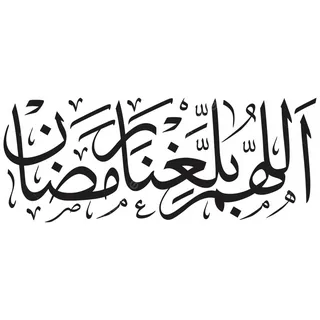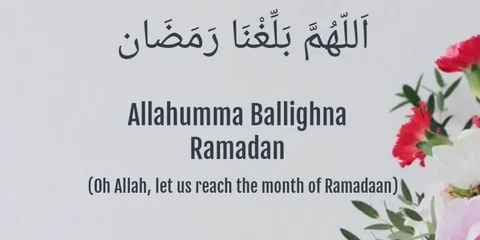Ramadan, the ninth month of the Islamic lunar calendar, holds immense significance in the lives of Muslims worldwide. It is a month of fasting, prayer, reflection, and community. The essence of Ramadan lies in self-discipline, spiritual growth, and seeking closeness to Allah, in yhis article on Arabian Tongue we will explorer allahumma ballighna ramadan meaning.
Understanding the Dua “Allahumma Ballighna Ramadan”

The phrase “Allahumma Ballighna Ramadan” translates to “O Allah, let us reach Ramadan.” It is a supplication made by Muslims to express their eagerness and anticipation for the arrival of the blessed month of Ramadan.
The Essence of the Dua
The dua encapsulates the heartfelt desire of believers to witness another Ramadan in their lives. It signifies a yearning for spiritual rejuvenation, divine blessings, and an opportunity to engage in acts of worship and self-improvement.
Historical Context
The tradition of reciting “Allahumma Ballighna Ramadan” dates back to the time of the Prophet Muhammad (peace be upon him). It underscores the importance of Ramadan in Islamic teachings and serves as a reminder of the Prophet’s exemplary conduct during this sacred month.
Allahumma ballighna ramadan meaning
Breaking down the phrase “Allahumma Ballighna Ramadan,” “Allahumma” is an invocation addressing Allah, the Arabic term “Ballighna” means “let us reach,” and “Ramadan” refers to the blessed month itself.
Cultural Significance
The dua “Allahumma Ballighna Ramadan” is recited by Muslims around the world, regardless of cultural or linguistic differences. It serves as a unifying expression of collective longing and anticipation for the spiritual rewards of Ramadan.
- Connection to Fasting: The dua is closely associated with the act of fasting, which is one of the Five Pillars of Islam. It symbolizes the beginning of a period of self-restraint, reflection, and heightened devotion to Allah.
- Recitation and Practice: Muslims often recite “Allahumma Ballighna Ramadan” in the days leading up to the start of Ramadan, as well as throughout the month itself. It is a humble plea for Allah’s mercy and guidance during this auspicious time.
- Personal Reflections: For many believers, the recitation of this dua evokes a sense of spiritual anticipation and excitement. It serves as a reminder of the transient nature of life and the importance of making the most of each moment, especially during Ramadan.
Spiritual Preparation for Ramadan

Preparing spiritually for Ramadan, the holiest month in Islam, is essential for Muslims to make the most of this special time of worship, reflection, and self-discipline. Here are some steps you can take to prepare:
- Intention (Niyyah): Begin by setting your intention for observing Ramadan. Intentions play a crucial role in the sincerity of your actions. Reflect on why you want to observe Ramadan and what spiritual goals you hope to achieve during this month.
- Increase in Worship: Start increasing your acts of worship in the weeks leading up to Ramadan. This could include performing extra prayers (Tahajjud), reciting Quran, making dhikr (remembrance of Allah), and engaging in voluntary fasting.
- Repentance (Tawbah): Seek forgiveness for past sins and make a sincere commitment to avoid them in the future. Use this time to reconcile with others and seek forgiveness from those whom you may have wronged.
- Educate Yourself: Study the significance and virtues of Ramadan, as well as the rulings related to fasting and worship during this month. Understanding the spiritual and practical aspects of Ramadan will deepen your appreciation for its importance.
- Plan Your Schedule: Organize your daily routine to make time for increased worship, including prayer, Quran recitation, and reflection. Allocate specific times for each activity to ensure consistency throughout the month.
- Increase Charity and Acts of Kindness: Ramadan is a time for generosity and compassion. Look for opportunities to give charity, help those in need, and strengthen bonds within your community.
- Make Dua (Supplication): Engage in earnest supplication, asking Allah for guidance, forgiveness, and blessings during Ramadan. Use this time to pray for yourself, your loved ones, and the entire Muslim Ummah.
- Prepare Mentally and Physically: Mentally prepare yourself for the challenges of fasting by gradually adjusting your eating and sleeping habits. Stay hydrated, eat nutritious meals, and get enough rest to maintain your energy levels throughout the day.
- Seek Spiritual Company: Surround yourself with individuals who inspire and support your spiritual growth. Joining community iftar, attending religious gatherings, or participating in online discussions can help you stay motivated and connected during Ramadan.
- Reflect and Set Goals: Take some time to reflect on your spiritual journey and set realistic goals for self-improvement during Ramadan. Whether it’s increasing your Quranic knowledge, strengthening your relationship with Allah, or developing better habits, having clear objectives will guide your efforts during the month.
FAQs
What does Allahumma Ballighna Ramadan mean?
Allahumma Ballighna Ramadan translates to O Allah, let us reach Ramadan. It is a supplication made by Muslims to express their eagerness and anticipation for the arrival of the blessed month of Ramadan.
When is Allahumma Ballighna Ramadan recited?
Muslims often recite this dua in the days leading up to the start of Ramadan, as well as throughout the month itself, as a humble plea for Allah's mercy and guidance during this auspicious time.
Is Allahumma Ballighna Ramadan recited in specific Islamic traditions?
Yes, the recitation of this dua is a widely practiced tradition among Muslims worldwide, regardless of cultural or linguistic differences. It serves as a unifying expression of collective longing and anticipation for the spiritual rewards of Ramadan.
What is the significance of Ramadan in Islam?
Ramadan is the ninth month of the Islamic lunar calendar and holds immense significance in the lives of Muslims worldwide. It is a month of fasting, prayer, reflection, and community, emphasizing self-discipline, spiritual growth, and seeking closeness to Allah.
How does Ramadan impact Muslim communities?
The observance of Ramadan has a profound impact on Muslim communities, fostering empathy, compassion, and a heightened awareness of the needs of others, particularly the less fortunate.
Conclusion
In conclusion, the dua “Allahumma Ballighna Ramadan” embodies the collective longing of Muslims for spiritual fulfillment and divine blessings during the blessed month of Ramadan. Its recitation serves as a poignant reminder of the importance of gratitude, devotion, and self-reflection in one’s journey towards closeness to Allah.

